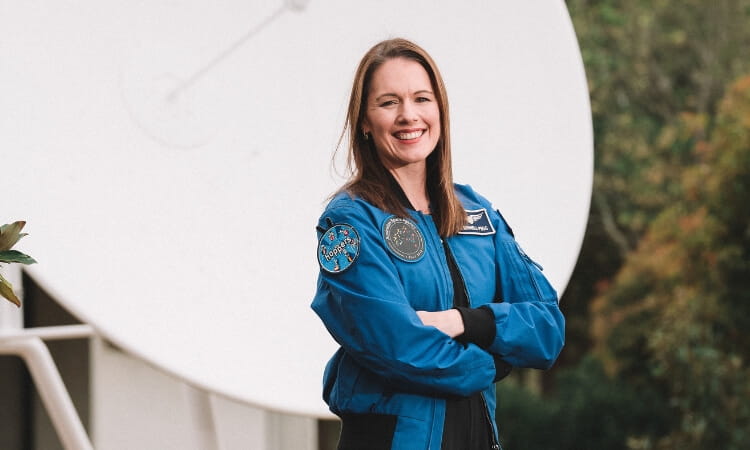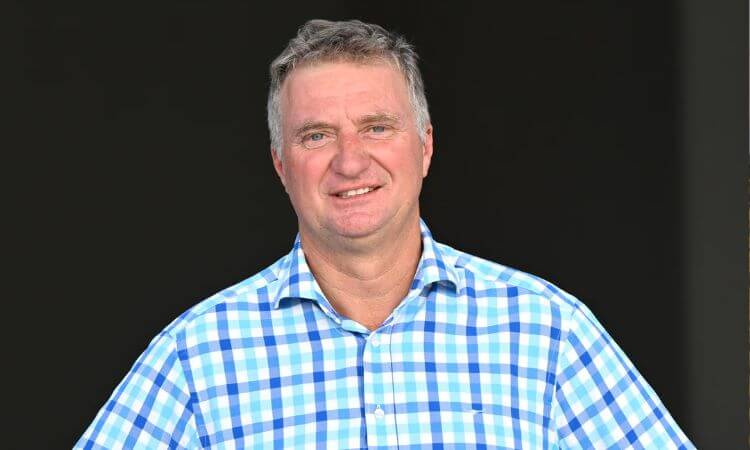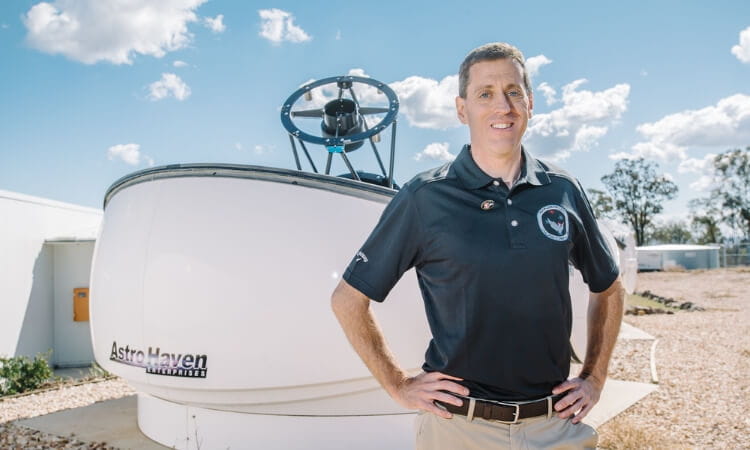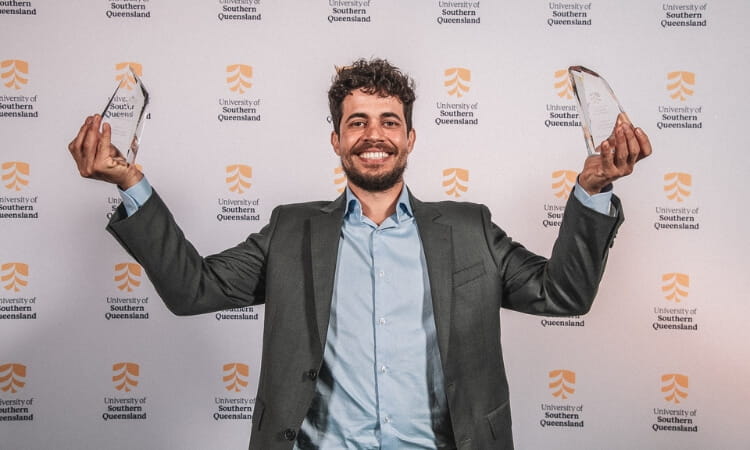First Australian-badged astronaut receives UniSQ honour

From looking into the skies with her trusty binoculars as a child to looking up at the balcony as her daughters watched her graduate from the European Astronaut Centre in Germany, Katherine Bennell-Pegg is no stranger to keeping her gaze high.
As the first astronaut qualified under the Australian flag and Australia’s first female astronaut, Bennell-Pegg has smashed through glass ceilings and helped bolster the dreams of thousands of young Australians hoping to travel to space.
It’s a mission she’s excited to continue with a new title: University of Southern Queensland (UniSQ) Honorary Doctor of Engineering.
Dr Bennell-Pegg said she was thrilled to accept this Honorary Doctorate with UniSQ and would use the platform to continue her education around the importance of Australians choosing STEM careers and – quite literally – aiming for the stars.
“When I was a child, like many others with the astronaut dream, I never dared hope that I could do it representing my country because we didn't have an Australian Space Agency, let alone an astronaut program,” Dr Bennell-Pegg said.
“This is a really exciting time to be an astronaut because of what's happening in space globally, but particularly all the activities happening here at home in Australia – especially at the University of Southern Queensland.
“UniSQ is doing such great things in space, from the work at the Mt Kent Observatory, to what the team’s doing with the UniSQ-led iLAuNCH Trailblazer, and some really amazing research coming out of the Space and Defence research flagship.
“It’s an incredible honour to be recognised in this way by UniSQ as someone who’s made a contribution to the field of space in Australia.”
Despite an almost 15-year space engineering career spanning the globe, working for the Australian Space Agency, and contributing to multiple missions and technologies, success hasn’t always come easily or without moments of doubt for Dr Bennell-Pegg. She described her training at the European Space Agency as “imposter syndrome on steroids”.
Out of over 22,500 eligible applicants, she was one of only 25 to successfully pass all selection stages … and then one of only six to graduate from Basic Astronaut Training in April 2024.
But it was careful preparation and hard work that kept her mission on track.
“Since I was a teenager, I’ve thought that most things are achievable as a product of time and effort. Talent just makes it easier,” Dr Bennell-Pegg said.
“I figured that even if someone else might be smarter than me in some way or meet some other kind of desirable criteria that I didn’t, that if I had prepared the best that I could, and I had put in that effort and that time, then I’m doing everything I can.
“Eventually, you've got to stop wondering and worrying whether you deserve it or not because you’ve got to prepare for the next stage; you just have to become worthy.”
While the moment of graduating on that stage was incredible for Dr Bennell-Pegg, it’s been the moments since then that have had the most impact – moments of meeting bright young minds keen to follow in her footsteps.
“It’s been humbling to realise the impact this is having far beyond just myself, far beyond even the space sector. Helping to unlock opportunities for our researchers and inspiring the next generation is an amazing privilege” she said.
A recent global study found that 86 per cent of kids were interested in finding new planets, stars and galaxies, and 77 per cent wanted to travel to space.
UniSQ and iLAuNCH Space Program Director Associate Professor Matt Richardson said recent advancements in space exploration, a renewed focus on STEM education, and people like Dr Bennell-Pegg advocating for the sector meant the dreams of “the Space Generation” were certainly within reach.
“It used to be the case that Australian kids could dream of going to space and it might have seemed a bit far-fetched, but that’s simply not the case anymore,” Associate Professor Richardson said.
“At the University of Southern Queensland, we are so proud to be training the next generation of Australian astronauts and rocket scientists and showing them that a career among the stars is entirely possible.
“And we’re thrilled to have such an amazing UniSQ advocate in Dr Katherine Bennell-Pegg, who is continually encouraging young people to choose STEM careers and work hard for their dreams, no matter how ‘otherworldly’ they may seem.
“Katherine may be the first Australian astronaut, but we’re determined to make sure she’s not the last."
Dr Bennell-Pegg said a career in STEM was one of the most rewarding and powerful dreams a person could have.
“So many of the people I’ve spoken to are drawn to space and STEM more broadly because they want to help; they are worried about climate change, natural disasters, quality of life, and conflicts around the world,” she said.
“A career in STEM allows you to be part of the solution. You don't have to despair about the problem if you apply yourself in STEM.
“You get to be at the centre of discovery and help address challenges every day. It’s a really wonderful area to be involved in.”
Dr Katherine Bennell-Pegg was officially conferred as an Honorary Doctor of Engineering at the UniSQ Toowoomba campus today (26 September).
The full list of UniSQ Honorary Award Recipients for 2024 are as follows:
- Professor Mary O’Kane AC – Doctor of the University
- Katherine Bennell-Pegg – Doctor of Engineering
- Professor John Billingsley – Emeritus Professor
- Professor Linda Galligan – Emeritus Professor
- Professor Patrick Danaher – Emeritus Professor
- Professor Rhod McNeill – Emeritus Professor
- Raynuha Sinnathamby – Fellow of the University
- Paul McVeigh – Fellow of the University
- Brett Otto – Fellow of the University
- Eve Fraser – Fellow of the University
- Russell Dykstra – Fellow of the University
- Trent Dalton – Fellow of the University


